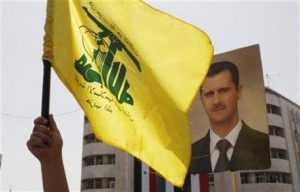
Emboldened by its strong ties with Iran and Turkey, Syria is ignoring U.S. demands that it stop backing Hezbollah, despite the risk that this will spoil its rapprochement with Washington and raise regional tensions.
Syria’s support for the armed Lebanese Shi’ite movement is at odds with its stated aims of improving relations with the United States and resuming peace negotiations with Hezbollah’s arch-foe Israel, diplomats and political analysts said.
Damascus has also sought to reinforce its alliance with Iran and expand links with Turkey, which hosted indirect peace talks between Syria and Israel until they broke down in 2008.
A stronger Hezbollah and increased regional clout could bolster Syria’s hand in any resumed negotiations with Israel, several analysts said.
President Bashar al-Assad told the Swedish daily Svenska Dagbladet last month that peace with Israel could be signed within six months “if things moved in the right direction.”
Yet a few days earlier, the 44-year-old leader had welcomed Hezbollah leader Hassan Nasrallah and Iran’s President Mahmoud Ahmadinejad to Damascus and proposed that Turkey, Syria and Iran form an Islamic bloc to counter Israeli and U.S. influence.
“You have to hand it to the Syrians. One day they host Nasrallah and Ahmadinejad and the next day they talk about their readiness for peace with Israel,” one diplomat in the Syrian capital said.
“They cannot, however, sustain this indefinitely. The United States may decide to end the rapprochement and the hype about a regional war could turn into a reality,” the diplomat added.
SHADOW OF 2006 WAR
Syria says it lends Hezbollah only political support and denies U.S. and Israeli accusations that it has helped the group re-arm since its 2006 war with Israel in Lebanon.
Damascus says Hezbollah cannot be expected to disarm as long as Israel continues to occupy Shebaa Farms, a tiny, well-watered slice of land that Syria and Lebanon say is Lebanese territory.
Syrian commentator Ayman Abdel Nour said Israel’s failure to defeat Hezbollah in 2006 had made Syria more immune to Israeli threats, and that Syria would not sacrifice the guerrilla movement for the sake of better ties with the United States.
Nour said Syria’s blossoming economic opening to its former adversary Turkey could help offset economic damage from U.S. sanctions that were imposed in 2004 partly because of Syrian support for Hezbollah and the Palestinian Islamist Hamas group.
“The political reading of the regime is that Syria’s continuity is tied to Middle East forces, mainly Turkey and Iran. Washington is no longer considered fearsome,” Nour said.
“Hafez al-Assad used to say that a good relationship with the United States was vital but coming too close to America was also harmful,” he added, referring to the late Syrian leader.
The younger Assad may be walking a tightrope, however. Talk of war in the Middle East has revived in recent months as Iran pursues a nuclear program viewed by Israel as its deadliest threat. Tehran says its nuclear work is purely peaceful.
Washington has said its rapprochement with Damascus is not open-ended and that it wants to see real Syrian policy changes.
U.S. President Barack Obama opened channels after taking office 14 months ago, but also renewed sanctions. In February he named an ambassador to Damascus after a five-year absence.
Robert Ford, the ambassador-designate, told the Senate Foreign Relations committee at his confirmation hearing on March 16 that a regional war could erupt if Syria did not stop what he termed its supply of long-range weapons to Hezbollah.
“If Hezbollah has rockets that can hit farther into Israel, it complicates every one’s calculations and raises the risk of a miscalculation and the risk of conflict,” Ford said.
“We do not see how it is in Syria’s interest for new fighting to break out in Lebanon. Fighting that could escalate and even drag in Syria itself,” he added.
Ford said U.S. sanctions would not be lifted as long as Syria backed Hezbollah, but acknowledged that Damascus had helped cut the flow of foreign fighters across its territory into Iraq, a major U.S. demand for the last five years.
Another diplomat in Damascus said U.S. officials had made it clear during their meetings with their Syrian counterparts that the issue of Hezbollah’s weapons was “a ticking bomb.”
“The Israelis did not want to broaden the war in 2006,” he said. “Their calculations now may be different with Hezbollah possibly strong enough to hit Tel Aviv.” Reuters

Leave a Reply
You must be logged in to post a comment.